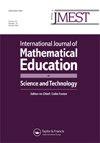Love stories in a differential equations classroom
IF 0.6
Q3 EDUCATION & EDUCATIONAL RESEARCH
International Journal of Mathematical Education in Science and Technology
Pub Date : 2023-09-25
DOI:10.1080/0020739x.2023.2251016
引用次数: 0
Abstract
AbstractWe believe that developing cultural competencies can help students learn mathematics and conversely that learning mathematical content can help students learn about themselves and others. Using frameworks introduced by Rendón (Citation2009) and Gutiérrez (Citation2018), we present a five-part bundle of activities for undergraduate differential equations course instructors, including one pre-activity reflection assignment, three modeling activities, and a final project. The Pre-Activity Assignment engages students to draw on their own personal and/or cultural experiences with the concept of love. Three activities focus on developing revision skills in mathematical modeling and practicing methods of solving systems of ordinary differential equations (ODEs). In these activities, students would collaborate to construct a relationship model consisting of a system of first-order linear ODEs and solve different model iterations with the characteristic polynomial, matrix form, or Laplace transform method. The final project connects the reflections in Pre-Activity Assignment with the skills developed in the three activities by inviting students to create a relationship scenario, model, revise, solve it, and present the conclusions. By engaging in this set of assignments, students connect personal and cultural experiences with the concept of love and perceive themselves and their peers in the curriculum, fostering a sense of belonging and relevance.Keywords: Mathematical modelingculturally relevant pedagogysystems of linear ordinary differential equationscharacteristic polynomial methodLaplace transform methodmatrix form Data availability statementDetailed solutions, sample MATLAB live scripts, and grading rubrics are available upon request. We purposefully do not include them here in case students attempt to search for solutions online.AcknowledgementsThe authors would like to express our gratitude to the guest editors and reviewers for providing valuable feedback and insightful suggestions. The authors also appreciate the organizations of SIMIODE EXPO 2022, where the idea of this project started.Disclosure statementNo potential conflict of interest was reported by the authors.Notes1 This section tests future SAT questions. These unscored sections look just like the scored sections of the SAT so students do not know which sections are scored or unscored.微分方程教室里的爱情故事
摘要我们认为培养文化能力可以帮助学生学习数学,反过来,学习数学内容可以帮助学生了解自己和他人。利用Rendón (Citation2009)和gutisamurez (Citation2018)介绍的框架,我们为本科生微分方程课程教师提供了一个由五部分组成的活动组合,包括一个活动前反思作业,三个建模活动和一个期末项目。活动前的作业要求学生利用自己的个人和/或文化经历来表达爱的概念。三个活动的重点是发展数学建模的修正技能和练习解决常微分方程系统的方法。在这些活动中,学生将合作构建由一阶线性ode系统组成的关系模型,并使用特征多项式、矩阵形式或拉普拉斯变换方法求解不同的模型迭代。期末项目将活动前作业中的反思与三个活动中发展的技能联系起来,邀请学生创建一个关系场景,建模,修改,解决它,并提出结论。通过参与这组作业,学生将个人和文化体验与爱的概念联系起来,并在课程中感知自己和同龄人,培养归属感和相关性。关键词:数学建模;文化相关教学;线性常微分方程系统;特征多项式方法;拉普拉斯变换方法;矩阵形式;数据可用性声明;我们故意不把它们包括在这里,以防学生试图在网上搜索解决方案。感谢特邀编辑和审稿人提供的宝贵反馈和深刻建议。作者还感谢SIMIODE EXPO 2022的组织,这个项目的想法就是在那里开始的。披露声明作者未报告潜在的利益冲突。注1:这部分测试未来的SAT问题。这些不计分的部分看起来就像SAT的计分部分,所以学生不知道哪些部分计分,哪些部分不计分。
本文章由计算机程序翻译,如有差异,请以英文原文为准。
求助全文
约1分钟内获得全文
求助全文
来源期刊

International Journal of Mathematical Education in Science and Technology
EDUCATION & EDUCATIONAL RESEARCH-
CiteScore
3.30
自引率
11.10%
发文量
123
期刊介绍:
Mathematics is pervading every study and technique in our modern world, bringing ever more sharply into focus the responsibilities laid upon those whose task it is to teach it. Most prominent among these is the difficulty of presenting an interdisciplinary approach so that one professional group may benefit from the experience of others. The International Journal of Mathematical Education in Science and Technology provides a medium by which a wide range of experience in mathematical education can be presented, assimilated and eventually adapted to everyday needs in schools, colleges, polytechnics, universities, industry and commerce. Contributions will be welcomed from lecturers, teachers and users of mathematics at all levels on the contents of syllabuses and methods of presentation.
 求助内容:
求助内容: 应助结果提醒方式:
应助结果提醒方式:


